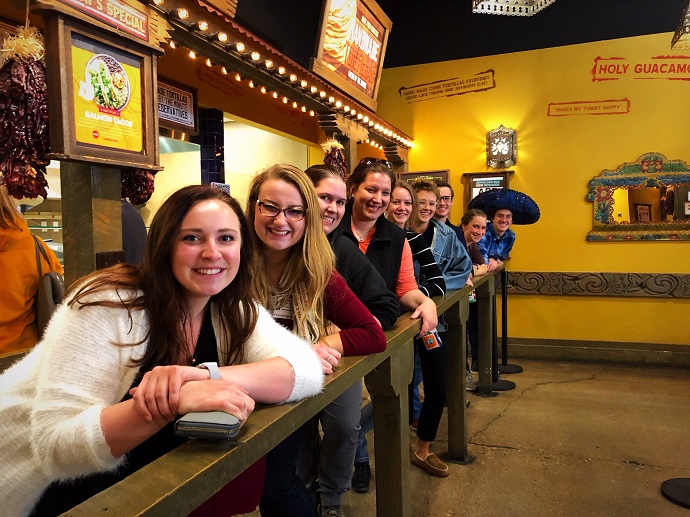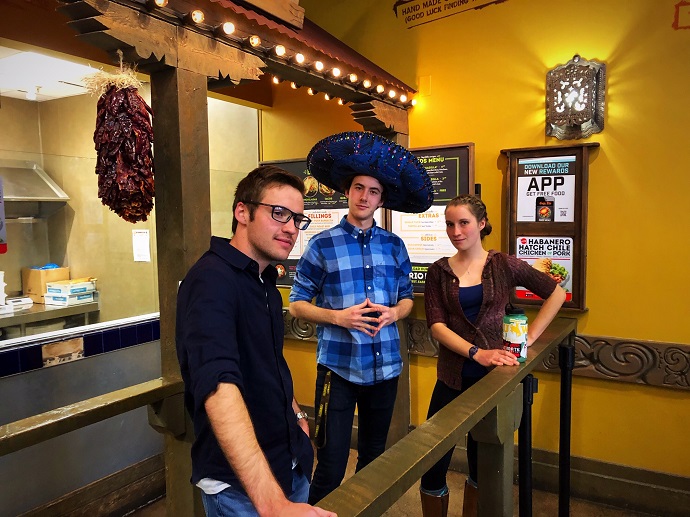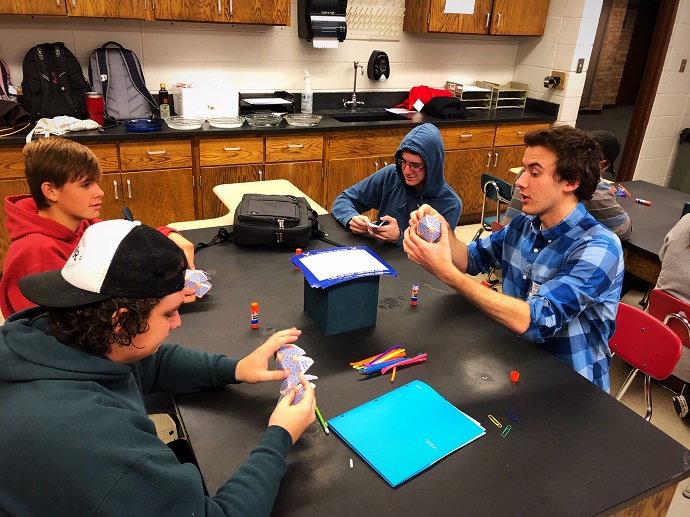2018-2019 PreK-12 SI Roadshow Highlights
Rock Springs Roadshow
On Tuesday, April 23rd, the Science Initiative’s LAMP/WRSP Roadshow traveled to Rock Springs High School. Three teams of undergraduate and graduate student researchers facilitated hands-on learning with Physical, Biological & Environmental science as well as mathematics classes. Ella DeWolf, Tyler Meyers, and Rebecca Upjohn created enclosed ecosystems called Winogradsky columns. The students used microscopes to observe microbial life in the columns and drew the biogeochemical cycling occurring in different layers. In Environmental Science, we spoke with students about bioplastics (polylactic acid) and allowed them to observe different microbial cultures that can degrade the plastic.
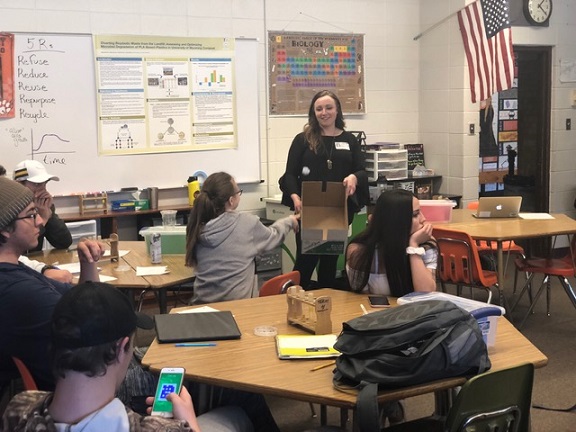
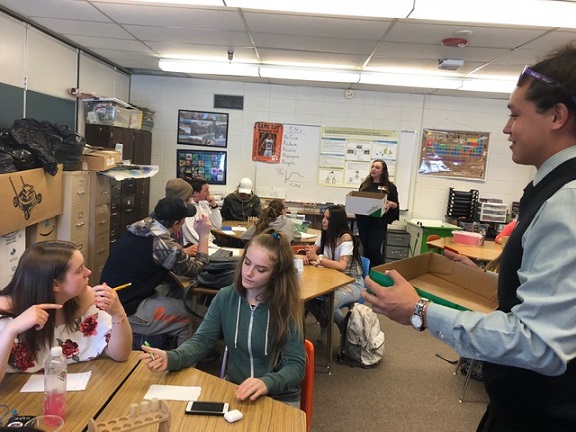
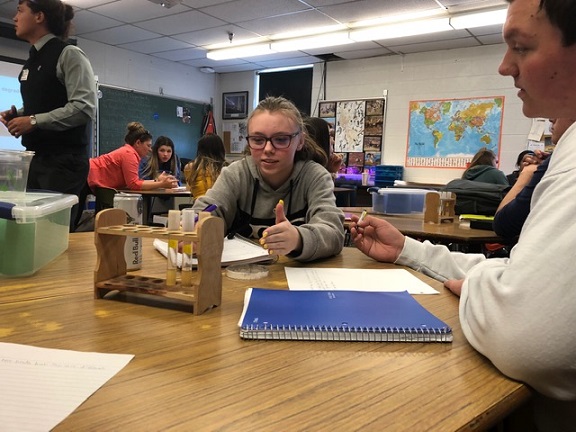
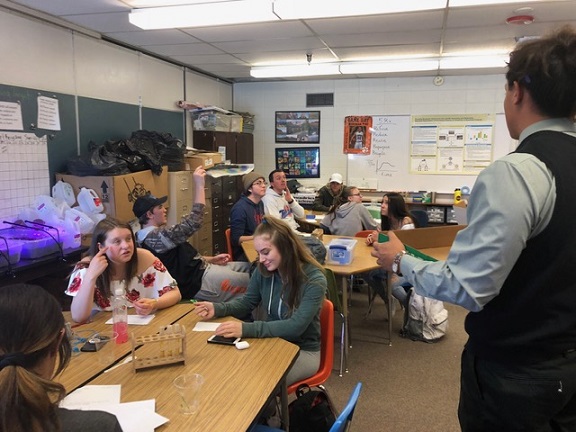
Olivia Croft and Jess Oldham facilitated student teams as they made hypotheses about which bacteria were degrading the bioplastic more rapidly. Alex Nichols, Jessica Sutter and Rebecca Upjohn led students through the trigonometry calculations that were needed for the construction of a Harry Potter chess board. Finally, Jessica Sutter taught students about how rotational velocity can be used to enable calculation of star and planetary motion.
The Roadshow Team consisted of:
- Ella DeWolf (Microbiology and Molecular Biology Double major from Laramie)
- Jessica Sutter (PhD student in Physics and Astronomy from Oregon)
- Rebecca Upjohn (PhD student in Ecosystem Science from California)
- Tyler Myers (Chemistry Major from Sheridan)
- Jess Oldham (Microbiology Major and Molecular Biology Minor from Lander Wyoming)
- Olivia Croft (Biology and Science Secondary Education major from Sundance)
- Alex Nichols (Physics Major from Texas )
Quotes from the Roadshow:
“I enjoyed how what we were doing was more hands on and you could see the organisms
move. I also liked how you guys were explaining what we were seeing when we were seeing
it.” -Trista Wales
“This Roadshow visit was an outstanding success. The students were incredibly engaged
with our Winogradsky metabolism and microscopy activity and even I learned a ton about
the organisms living in that mud” - Ella
“I found it very educative and also exciting to be able to do the roadshow! I most
enjoyed being able to create slides and look into microscopes. We also learned about
a new animal- the Daphnia.” - Michaela
“Getting to do the hands on activities was awesome! I loved seeing all the different
bacteria and other living things and getting to experience them with my own eyes.”
- Heather
“The hands on activities were really cool. We learned about the different levels of
marine life, involving the plants and animals found in there.” - Megan
“This Roadshow was very eye opening. It allowed us students to take a deeper look
into science and use tools to discover a ecosystem.” - Conner
“This Roadshow was a very interesting experience. I liked the hands on work and the
way would could look at everything ourselves. It was interesting to learn about how
many levels are in a marine biome.” - Emma
“I liked the hands experience that we got from the Roadshow. It helped to learn how
the different levels of a marine biome.” - Levi
“I enjoyed the experience, although we didn’t see much it still was quite the experience.
I liked seeing the microscopic organisms. It’s quite the experience seeing something
so small yet so up close.” - Owen
“I wasn’t here when they showed up but I’m sure it was really cool learning about
that type of stuff hands on.” - Lillie
“I only knew the basics of the biology system shown to us. It was an experience to
see what made up the ecosystem and to look inside specific parts.” - Yesi
“I liked that we were able to look at someone’s actual experiment and observe the
things inside of it. It was especially cool that we got to decide what to look at
in the column.” - Kade
“I loved the hands on experience, usually we aren’t able to do anything, and are left
to observe. I learned many new things and got to look at things like microorganisms.”
- Samantha
“The roadshow was extremely interesting and fun. The experiment they showed was truly
incredible. They were great at helping us when we had questions. Overall, it was a
great experience and I would enjoy doing it again.” - Cody
“I thought that it was very well planned out and we did some interesting things and
found cool stuff I didn’t know existed.” - Kamren
“I really liked the physical examples and how much we got to look at and how it was
kind of what we wanted to do, while still being directed. I also thought it was really
cool all the cool things we learned.” - Kayla M.
“I enjoyed how we were able to get a closer look at the things in the tube and we
got to know more about what it really was.” - Emily
“I liked when we got to personally sample the tube things” - Brennan
“ I enjoyed when we got to look at the ecosystems through the microscope, and we saw
some pretty cool bugs and such.” - Ava
“I enjoyed how we got to personally get the things from the tube and how we got to
look at it by ourselves.” - Charles
“I enjoyed how we got to do hands on learning about things we have not really looked
into before.” - Alexis
“Being able to look into the microscopes at the plants was really cool because it
showed some of their cell structure. Also looking at the tiny organisms was cool as
well because you could see them very well” - Kiley
“I enjoyed that they included us in doing things for the experiment and how they explained
everything in good detail.” - Tyler
“I thought the presentation was very interesting and I liked seeing the microorganisms
and how they explained a lot of the presentation pretty well.” - Quinten G
“It was fun doing all the different things we did and learning all the different things
we did”-Brayden
“I really enjoyed how helpful and hands-on they were in assisting us with the procedure
and how cool it was to see all the things under the microscope.” - Davan F
“I liked how interactive and hands on it was. They gave us a small explanation and
mostly let us figure things out.” - Darwin
“I enjoyed how helpful and respectful the team was. They helped with questions on
the subject.” - Kellen
“It was a very unique experience in which we got to see how life can be complex but
so small. It also cleared up some questions I had about this subject.” - Lucas J.
“I enjoyed it a lot, it was really cool seeing the daphnia under the microscope.”
- Kelsey C
“I thought the Roadshow was an experience that was different from many other learning
experiences we learn about in class. It was much more of a hands-on project and I
feel like the school system doesn’t do enough of those. It kept my interest and I
learned a lot of interesting things that I actually thought were cool, especially
the Daphnia.” - Rusty
“The Roadshow was fun. We were allowed to make guesses on what we saw, and we were
told and learned things like. A daphnia has a small brain, but you can see its digestive
system. We learned things we might not have learned another time.” - Savannah
“I really enjoyed how in depth they were at explaining things that maybe we haven't
recovered yet.” - Karli
“I really enjoyed how the team made it easy for us to ask them questions and label
our concerns.”
“I enjoy the respect and thought that was put it to the project. It being really interesting
to see that in a different view point.” - Zoey
“I got a closer look at the types of organisms that live in mud and it was very fascinating.
I didn’t know there could be so much life in just a little bit of mud.” - Melaina
“I enjoyed seeing the different layers that was in the ecosystem.” - Giovanna
“The entire experience was really engaging, as we were able to look at the columns
and look through microscopes to see further.” - April
“The roadshow was a great idea to get people interested in biology, this was also
a very fun experience” - Ian
“I loved all the hands on work they let us take part in. They didn’t only show and
teach us about these things, they let us use microscopes and look at interesting things
ourselves. It was a great experience!” - Brecken
“This experience seems to be very exciting and cool. It is awesome that people can
do this and learn so much from it.” Abi
“I liked how we were able to see what’s actually happening.” - Joe M
“I liked all the hands on work they let us do.“ - Hunter
“The enclosed ecosystems were great to absorb.” - Maria
“This experience was cool because it was hands on.” - Rowdy
“I got to have a closer look at the different types of organisms that could live in
an environment. Even something that small can be home to many different organisms.”
- Derek M.
“It was interesting learning that sun’s also move and I really like how they showed
us the information.” - Charles F.“It was interesting to see exactly how the stars
move and how Pluto moves.” - Kelsy
“The part I found interesting was when we learned that we use the Electromagnetic
Spectrum to find other planets out there or to see their location around a star such
as our body of planets give example to.” -Evan Croff
“I enjoyed being able to understand how and why things work on the electromagnetic
spectrum.” - Ethen Copyak
“I found it interesting that our sun and other sun’s in this universe move in their
own little orbit, and I liked how they showed us this in the information they gave
us.” - Joseph J.
“I thought it was very interesting how they showed us how to use a prism and how they
used prism to find out what was in or on a planet. Also how suns actually orbit their
planets and don’t just stay in one place.” - Devin Osborn
“I really liked it when they let us use the prisms and see the different colors due
to the wave length.” - Jerricka Ainge
“I really enjoyed how you guys showed more visual and hands on things to show us how
you find certain elements in space instead of just having us sit through a presentation
that would have taken majority of class, I also found that the sun having its own
small orbit thing to be interesting and something that I and many others didn’t know
before.” - Ruben
"I found it oddly cool that are sun had its own little orbit I also thought it was
interesting how the light bend with different gases.” - Destiny
“I really liked how engaging the activity was and what it helped me understand individually.”
“I found it cool how they showed us how to the microscopes and we physically got to
do the stuff.”
“I really enjoyed this. I found it interesting what they had to say. I also enjoyed
the first time they came in.” - Cadence
“I really enjoyed what they taught us and what they showed us. It was amazing to learn
new things that i didn’t even know about.” - Chaz
“I found it very helpful to me learning new things and gaining new unique information
from different people that have higher skill sets.” - Jaxon
“I really enjoyed it and how I learn more about space and there is a lot more we could
learn from them.” - Chase
“I liked how they elaborated on the different subjects about space, and how they actually
interacted with us. I personally love space and I learned a lot from the roadshow,
thank you!” - Kyrah
“The roadshow was really interesting.” “It was a lot of fun looking at the columns
and being able to explore moving things under the microscope.” -Kennedy
“I enjoyed the engaging style of teaching; it was very hands on.” - Brayden D
“The roadshow was super interesting, and it was exciting looking at the columns. I
learned a lot about how small ecosystems can be, yet how complex those interactions
can still become.” - Shiva
“The time we spent with the speakers was well planned and structured. I liked their
ability to keep everyone engaged while still keeping the activity mostly self-led.
The content matched our previous research in class almost exactly, which was nice.”
- Gwen
“The roadshow was interesting.” “It was cool looking at the weird bug in the water
and also what the algae looked like.” - Aiden
“I enjoyed the hands on activity.” - Claire Carlson
“The parts I found interesting was all the levels that were in the container that
was simply found in the lake. I didn’t think there were that many colors used in
those levels as well.” - Megan Zotti
“The roadshow was very interesting, they explained everything good and i loved looking
under the microscope.” - Sam Wheeler
Riverton Roadshow
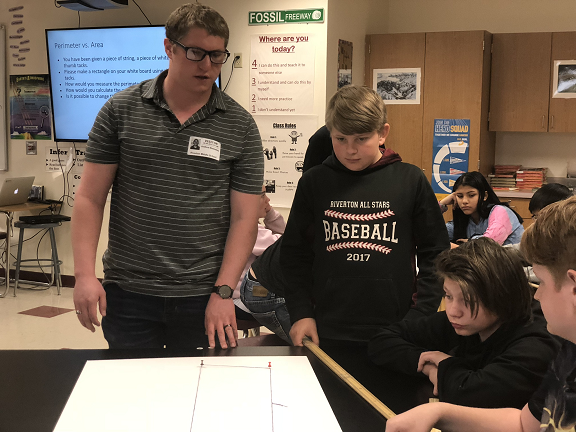
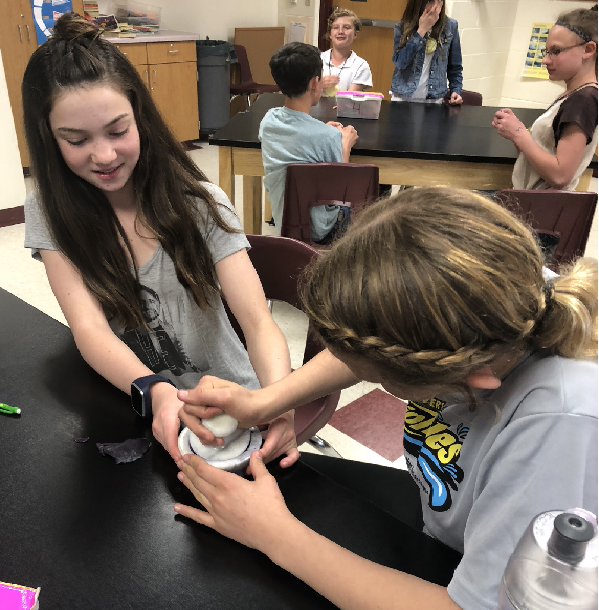
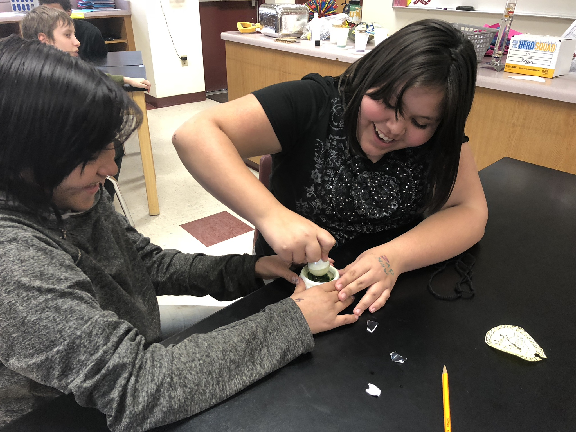
From here, Ella talked about how viruses maximize space for the genome by building a capsid “house” that is an icosahedron. Jessica talked about how the volume of pulsing stars change and how that affects light intensity. She noted that astronomers can determine the volume of a pulsing star by measuring light intensity.
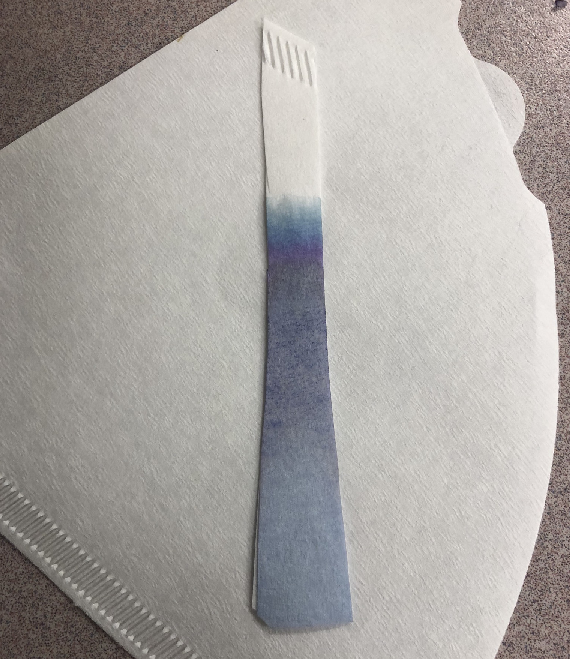
The LAMP/WRSP Roadshow traveled to Riverton on Friday, April 5th to work with Christina Bekken and Nanna Frazier’s 7th grade students. Ella DeWolf, Joshua Walmsley and Jessica Sutter designed curriculum to allow students to work applied problems in which they used their knowledge of proportions. The first activity was designed by Joshua and asked the students to use string, a white board and thumbtacks to make a rectangle. He then asked them to calculate both the perimeter and area. Next, he inquired, “Can you change the area of the rectangle even though the perimeter will always stay the same?” Many student teams then naturally made a hypothesis. Some of them even wrote down: If the perimeter does not change than the area will not change. We asked them how they would find out if this were true. They quickly rebuilt their rectangles and found that the area changed. This quickly became a competition as the students worked to see who could maximize area. We asked students to make an area to perimeter proportion and see how it changed. Finally, we asked them how this would apply in science and technology? One students hand shot up and he said, “well if you were building a house, you would want to consider maximizing the area of the footprint!”
For another class, Ella designed an activity in which students used the proportion of their shadow length to their height, along with the length of a light pole shadow, to calculate the height of the light pole. For the final class of the day, Health and Nutrition, Ella showed students how to do liquid chromatography with ground up red cabbage, nail polish remover and coffee filters!
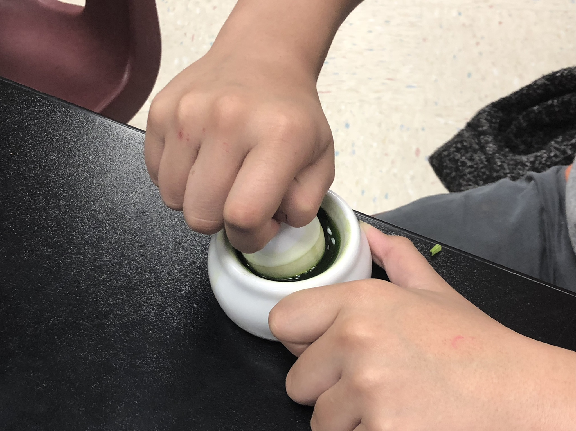
The visits were transformative for all involved:
I was very impressed to see students using the scientific method to foster discovery! One group I worked with initially hypothesized that it would be impossible to change the area of their rectangle without changing the perimeter. After thinking about how to test this, they found that their hypothesis needed a slight revision. Through discussion and experimentation, this group adjusted their hypothesis to fit the data they gathered, in which they found they could use the same perimeter to build shapes with many different areas! This is exactly the processes I work through in my research! It was so awesome to see the students doing real science! ~Jessica
The Roadshow positively impacts all who are involved with the activities. It is great for younger students to get a taste of the scientific method and work through problems as a group. Working on problems that can be applied to the real world helps the students understand why science is important. As the Roadshow team, it is very rewarding to see the younger students excited about science and to see their minds come together to solve problems. The Roadshow has helped me realize the importance and benefits of sharing my knowledge with others. ~Joshua Walmsley
The Roadshow provided a new opportunity for the students and staff at Riverton Middle School to work on applying cross-curricular concepts. Students participated in hands-on activities, while combining math and science standards. They learned a lot from interacting with Rachel, Josh, Jessica, and Ella, and from the discussions they facilitated in the small groups. It was beneficial for me, as a teacher, to have the activity modeled. Also, it created further interest for the students in how they could specialize in science when they go to college, and it widened their perspective on how they can apply science and mathematics. It was educationally beneficial, exciting, and fun for the kids and staff! ~Nanna Frazier (7th grade math teacher)
During science class, I met 4 people. Jessica, Josh, Ella, and Rachel. They were there to teach 7th grade science class about perimeter and area. They taught us that you can keep the same perimeter, but also change the area. They all walked around class and helped groups. You could tell that they were happy to be there, and we were also happy they were there. ~Sara (7th grade student)
The college students that came to RMS to educate us on area and volume and I enjoyed it because they showed us that if you increase the distance in a shape it will increase the volume.The students that came over explained what they studied or majored in to show us what we could study when we go to college. I also enjoyed it because they also taught us to calculate the shape to determine the volume. It was nice that they drove all the way here just to work with us. ~Korben (7th grade student)
The Roadshow Team consisted of:
- Ella DeWolf (Microbiology and Molecular Biology Double major from Laramie)
- Joshua Walmsley (Chemistry Major from Douglas)
- Jessica Sutter (PhD student in Physics and Astronomy from Oregon)
Rozet & Moorcroft Roadshow
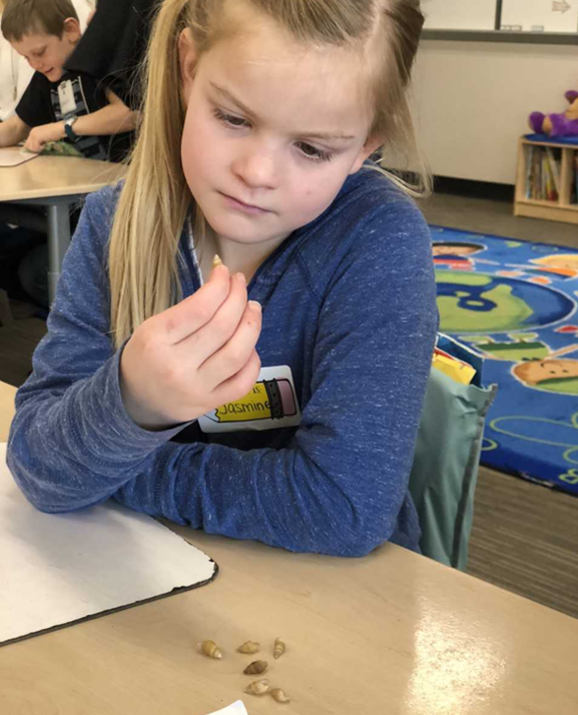
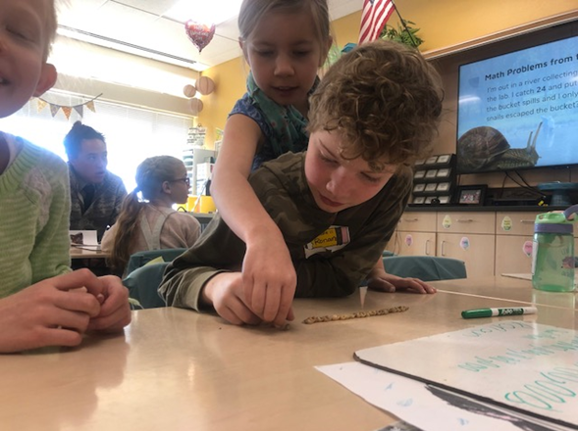
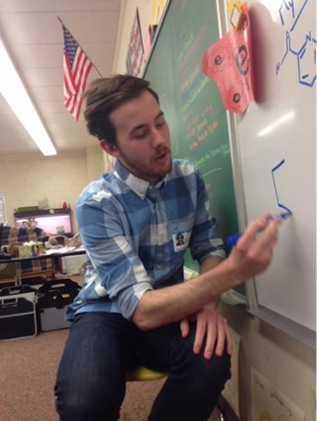
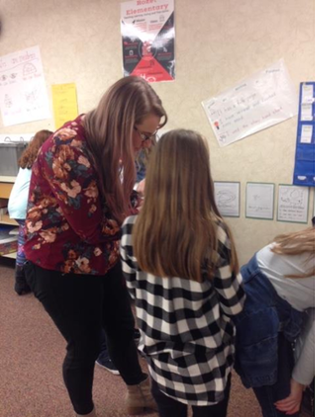
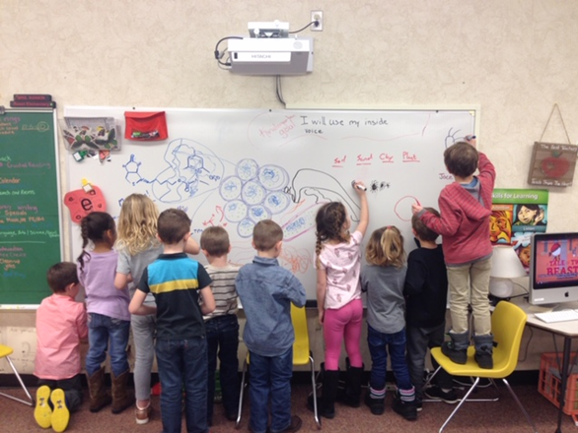
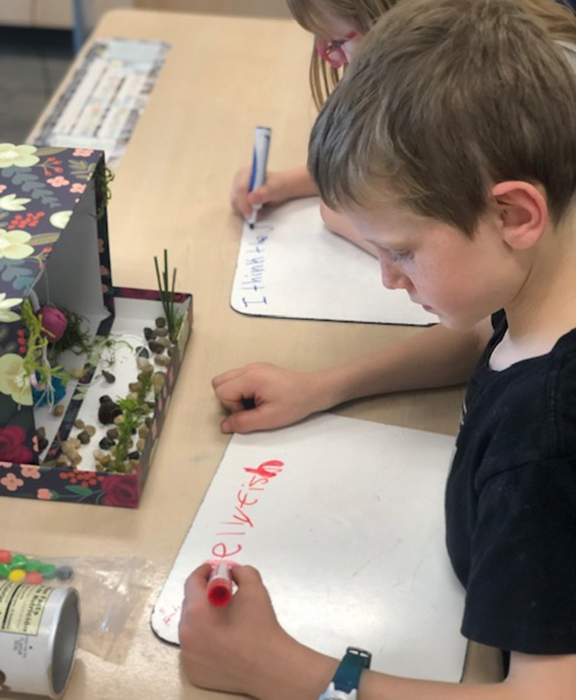
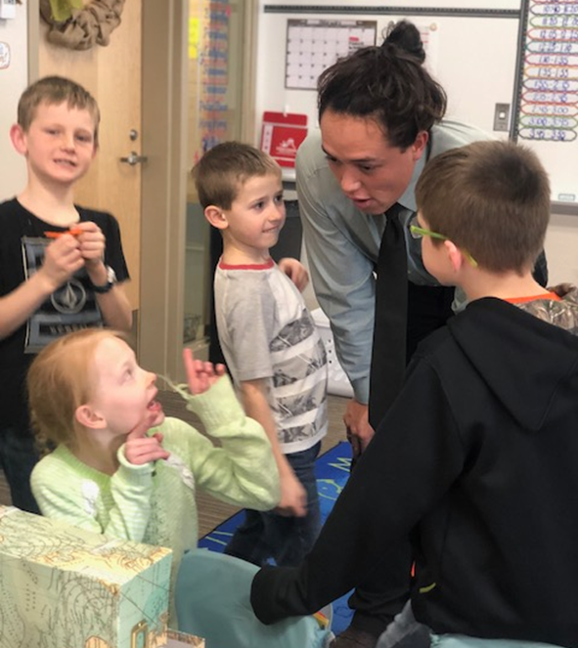
The LAMP/WRSP Roadshow traveled to Moorcroft, Rozet and Gillette on Wednesday and Thursday, the 20th and 21st of February. In Moorcroft, Olivia Croft, Jess Oldham and LAMP Director, Rachel Watson spent the day with Jenna Thomas’s second grade students. The students learned about Olivia’s research on snails and Jess’s research on antibiotic resistance in Wyoming waterways. Jess and Olivia led the students through math problems that they would do in their research; the students even learned Scientific Notation. At the end of the day, one student said that the learning the lazy scientists way to write numbers [scientific notation] was her favorite thing. In the afternoon, the students created a food web by throwing a ball of yarn from the primary producer to consumers and eventually to apex predator. Olivia and Jess then led them through the building of their own ecosystem.
On Thursday, Jess, Olivia and Rachel taught Gillette’s Rawhide Elementary students
to ‘learn like Jungle Tigers’ while Ella DeWolf, Tyler Myers and Mercedes Fermelia
led students at Rozet Elementary through a journey into plant rhizospheres [communities
of roots] of the soil and their potential to mitigate erosion. Even before the Roadshow
team left Rozet Elementary, the students had created huge, handmade thank you cards.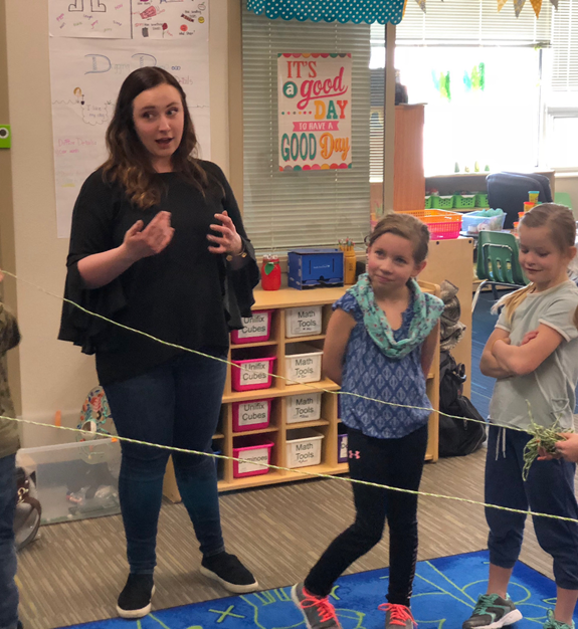
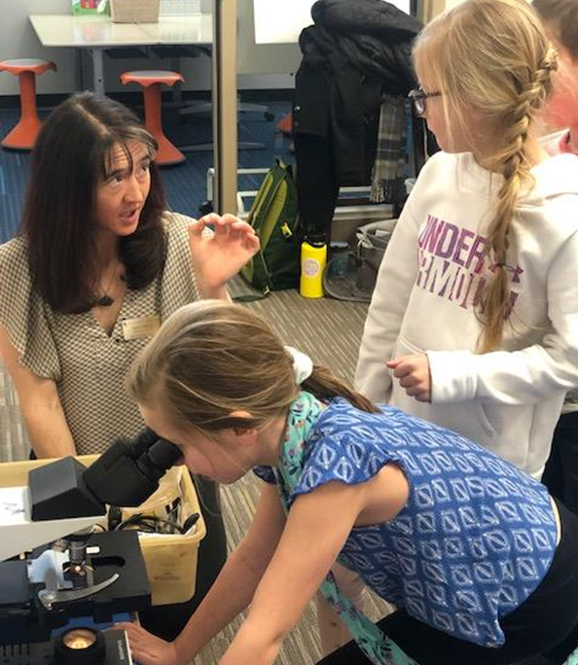
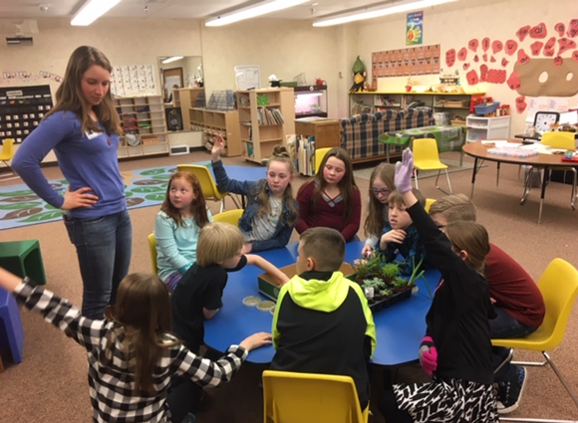
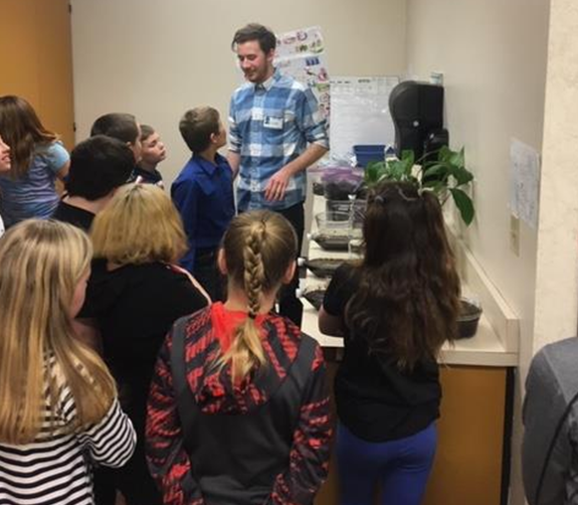
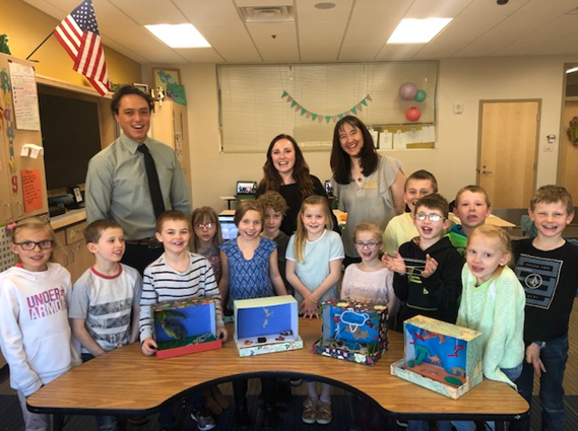
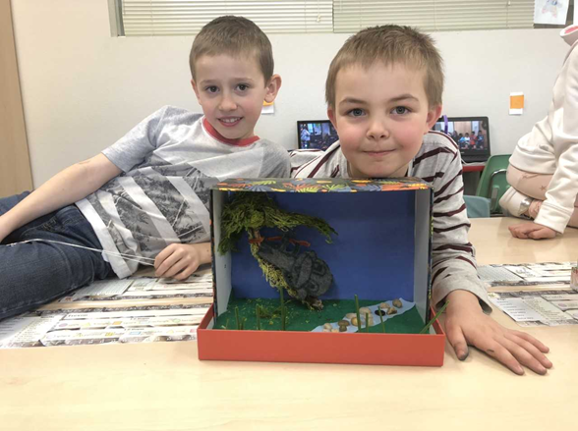
The Roadshow Team consisted of:
- Ella DeWolf (Microbiology and Molecular Biology Double major from Laramie)
- Tyler Myers (Chemistry Major from Sheridan)
- Mercedes Fermelia (Microbiology Major from Cheyenne)
- Jess Oldham (Microbiology Major and Molecular Biology Minor from Lander Wyoming)
- Olivia Croft (Biology and Science Secondary Education major from Sundance)
Note: Brett Ralston (Microbiology Major from Washington) contributed a book and planning
to support our “Build an Ecosystem Activity”; Josh Walmsley (Chemistry Major from
Douglas) contributed a fluorescence demonstration.
The visits were transformative for all involved:
Quotes from the Roadshow:
“There is something magical about the curiosity of a kindergartener. They all had tons of energy and were so excited that “the scientists” had come to visit. Things that I do on a routine basis, such as looking through a microscope, were new and exciting experiences for them. Their energy reminded me why I decided to study science in the first place -- science is super cool!” - Mercedes
“It’s amazing that a small investment of time and effort can change the course of a student’s life. I’m thankful to make those investments as part of the roadshow, even if that student is just me” - Jess
“Watching students discovering the world is awe inspiring--whether it’s looking in a microscope for the first time to observe a microbial community, or creating a model ecosystem, the enthusiasm that students have for exploring their world is incredible. We have an amazing group of future scientists in Wyoming,” - Olivia
“It is absolutely stunning to me that collegiate level students could effectively teach second graders. It was a beautiful thing to witness. The kids were engaged the entire time; they were a part of hands on learning, using strategies that didn’t require a pencil and paper. They were able to learn about scientific components that aligned to our curriculum, yet also went above and beyond. Kudos to the LAMP Roadshow! You have me in awe”. - Jenna Thomas, 2nd Grade Teacher, Moorcroft K-8
“You are so nice.” - Jasmine, 2nd grade student, MK8
“I had fun with the snails.” - Kyrra, 2nd grade student, MK8
“I am so glad you came to visit us.” - Isabella, 2nd grade student, MK8
“I liked making the colonies.” -Levi, 2nd grade student, MK8
“I like the snails were the best.” - Danica, 2nd grade student, MK8
“Are our scientist back today? How about tomorrow?????” - Ezra, Kindergarten student, Rozet
“I liked learning about the lazy scientist.” - Jasmine, 2nd grade student, MK8
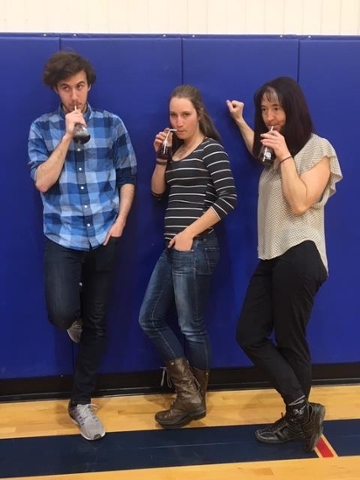
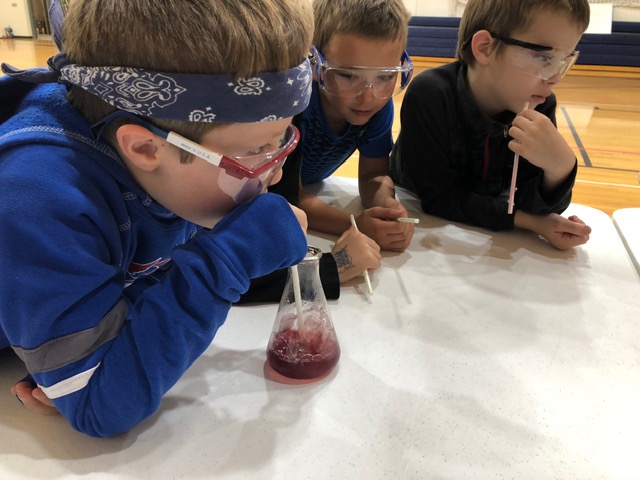
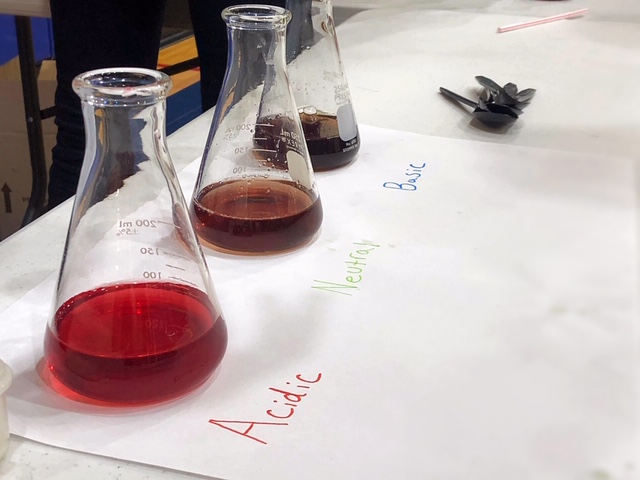
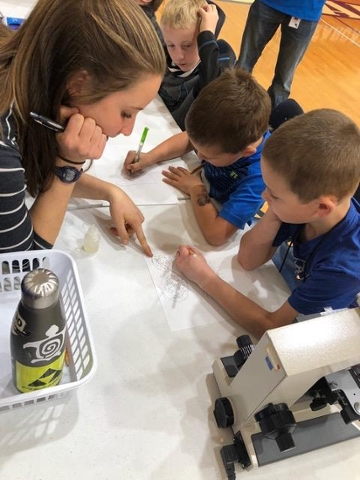
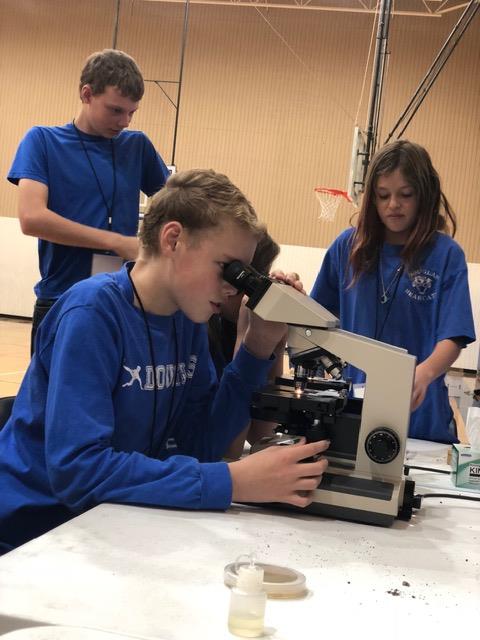
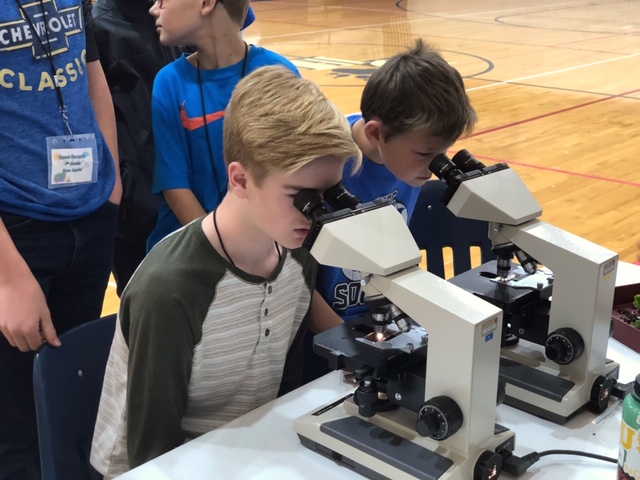
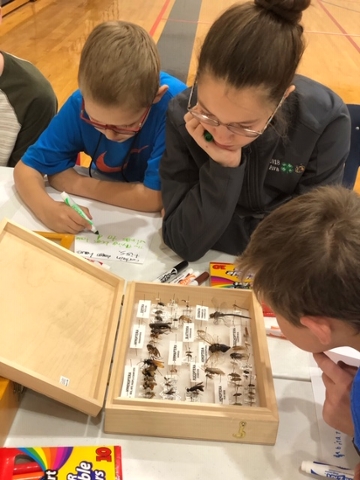
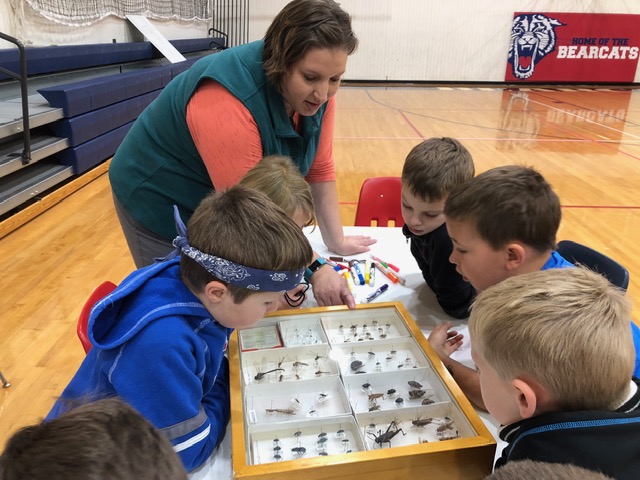
Douglas Roadshow
On Friday, November 9th, 2018, the LAMP/WRSP Roadshow hit the road again and did active learning in the gym with 66 students in grades K-8 from rural school districts around Douglas. We immersed the students in the chemistry of ocean acidification, the ecosystems of plant rhizospheres and adaptations of the Asian Longhorn beetle! Before diving into these stations, the students played a rousing game of selective pressure in which most were monkeys with varying tail lengths. The predators, Bear Cats, sought to catch the monkeys. After five minutes of hard running through the gym, students saw how monkeys with short tails were selected for!
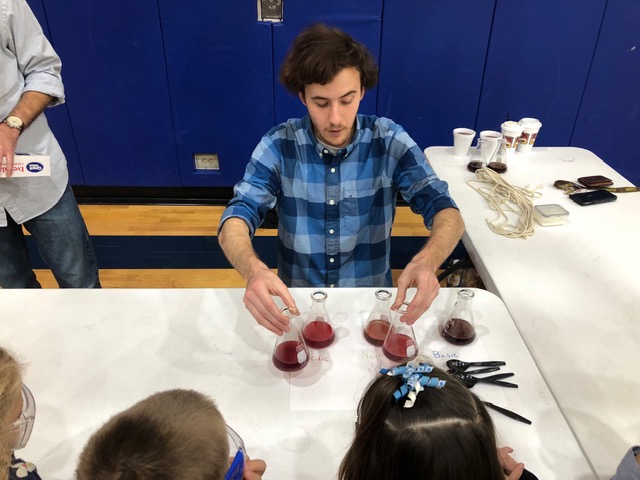
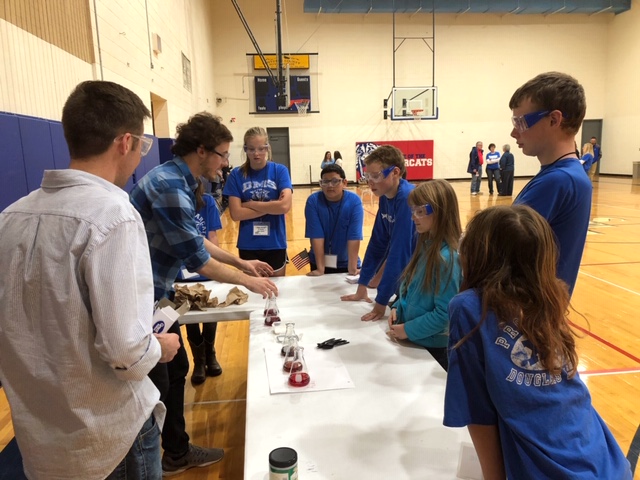
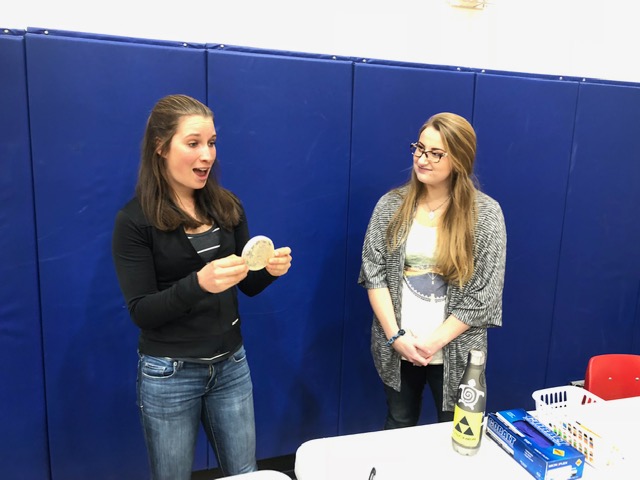
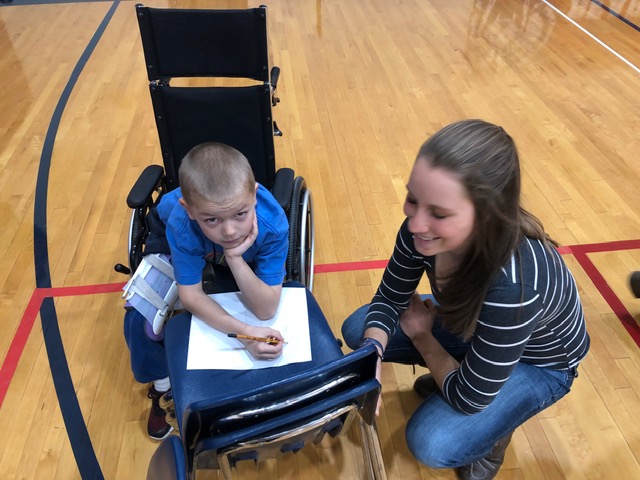
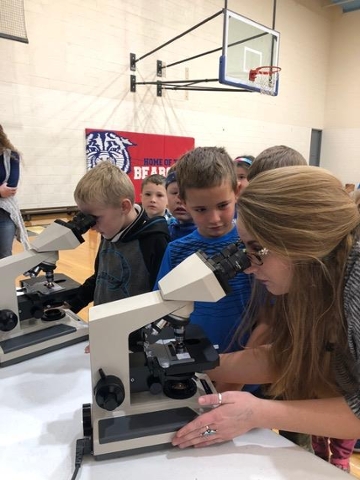
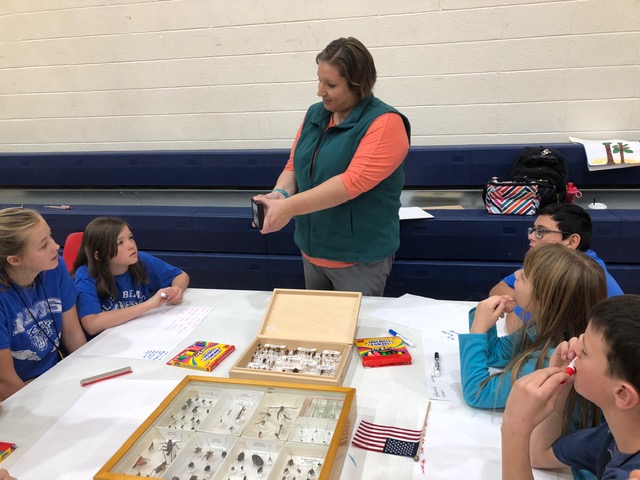
Student and Teacher Quotes:
“Putting the snail shell powder in was great!” ~Treston, 3rd grader, Dry Creek
“I liked the part where we played the game about the long tails and the short tails. I learned that there are different ways for animals to survive. The short tails survived because it was harder for the predators to get their tails.” ~Allison, 3rd grader, Dry Creek
‘I had a short tail and I survived!” ~Matthew, kindergartener, Dry Creek
“The bugs were cool! I liked the grasshoppers because I studied them last year.” ~James, 1st grader, Dry Creek
“I loved going to the bug table and seeing the Asian Longhorn Beetle. How big is the biggest bug in your collection? I also have another question, is it possible to go from basic, to acidic, then to neutral?” ~Hannah, grade 7 Dry Creek
"Thank you for coming. I has so much fun with you guys. Thank you for teaching us about the ocean, bacteria, and bugs. I want to give you another thanks for what you guys taught us about.” ~Daniel, grade 4 Dry Creek.
“I had so much fun. My questions are: For the bug table- where did you get all the bugs from including the Asian Longhorn Beetle?
For the ocean table- why does the water turn red when we blow CO2? We think it is because CO2 is more acidic, is that correct? For the bacteria table- Why is there so much bacteria in plant soil?For all- When will you come back? I really had fun with you guys!” ~Rylie, grade 5 Dry Creek
“I learned a lot about the ocean and the PH scale. I also learned about beetles including the Asian Beetle. I also liked the bacteria station because I could look in the microscope and see bacteria that I can’t see with my naked eye. Thanks so much for coming- hope to see you again!”
~Jesus, grade 6 Dry Creek
“I liked all of your stations. How do you kill the bacteria when you first get it from the soil?”~Ben, grade 4 Dry Creek
“The sessions with our students were enriching and I appreciate the fact that your team worked with our teachers to gear your stations to our classroom learning, so that this time together could be an extension and an enrichment of what we are already doing. Teachers, just like students, learned so much from your visit that we can apply within our daily lessons. We cannot wait to partner with you again and also to get guidance of future activities we can use to cover multiple science standards and those standard’s three dimensionalities! Thank you for being willing to travel to us, to be excellent teachers, and to share your knowledge. This program helps to strengthen science in our schools and also gives students models (of your UW students) to look at in order to help our students frame and plan their own futures!!!!” ~Mrs. McGuire, Dry Creek
Quotes from the Roadshow Team:
“The looks of excitement on the student’s faces were truly inspiring. To be able to see that spark in a curious mind is revitalizing to us as educators! Tyler and I had a fantastic time showing students how CO2 emissions push the equilibrium towards a more acidic ocean and the impacts that can have on ocean life and the ocean environment. We have such a great crew of roadshowers, and the impact we have on the state is wholly important for bettering Wyoming’s education.” - Brett
“The best thing about this trip is that everyone involved seemed to leave feeling inspired. For me, there is very little more rewarding than seeing the look on a kid’s face when something clicks and they understand a new idea or when they see bacteria under the microscope for the first time. I felt like I was able to open the door to a microscopic world for these students and in return, their curiosity and excitement inspired me. I was equally inspired by my fellow roadshowers and I know the kids were too. It is truly an honor to be a part of this roadshow crew!” ~Ella DeWolf
“The Roadshow is such an amazing way to connect with students around the state. I thoroughly enjoy every trip because I am continually inspired by not only the students, but my fellow roadies. One of my favorite parts of this trip was seeing students dig in to expose plant root systems and see their reactions when they looked into the microscopes.” ~Mercedes Fermelia
The Roadshow Team consisted of:
- Brett Ralston (Microbiology Major from Washington)
- Ella DeWolf (Microbiology and Molecular Biology Double major from Laramie)
- Rebecca Upjohn (PhD student in Ecosystem Science from California)
- Tyler Myers (Chemistry Major from Sheridan)
- Mercedes Fermelia (Microbiology Major from Cheyenne)
Rock Springs Roadshow
On October 26th, 2018, the LAMP/WRSP Roadshow traveled with seven undergraduate students
and two graduate students to Rock Springs High School. We engaged twelve science classrooms
and nearly 240 students in active learning exercises surrounding topics ranging from
the biochemistry of oil spills to the replication of human papillomavirus. It was
a magical day and we were inspired not only by the high school students, but by the
interdisciplinary prowess of our coworkers.
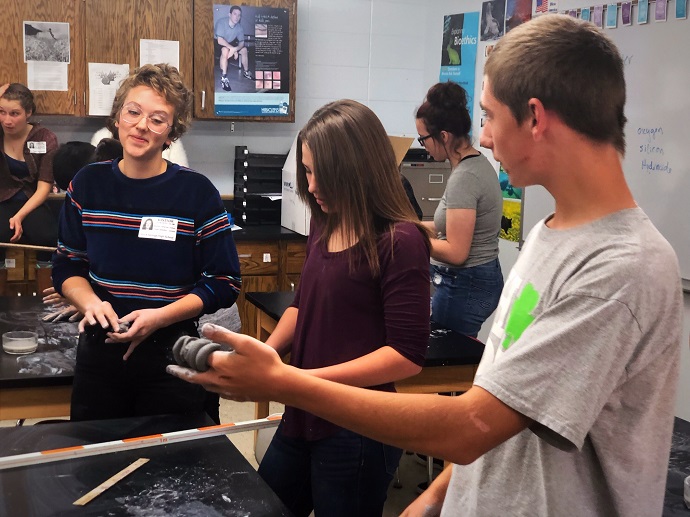
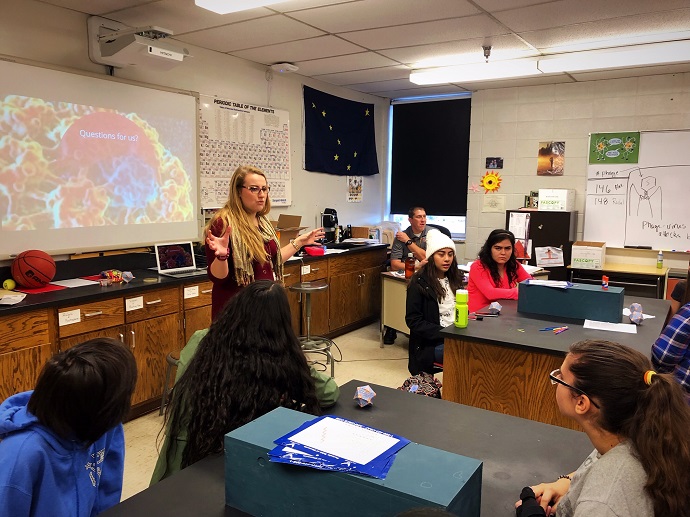
Rock Springs High School student quotes:
"It was really fun and I enjoyed y’all coming down to teach us. I am glad you did hands on activities with us instead of just explaining it. It was a joy and I’m happy you guys decided to come and teach us."
"I really liked the presentation and I learned a lot because it wasn’t just a bunch of random information thrown at us. You guys made it interesting and I really enjoyed the hands-on activities. Thank you so much!"
"I liked having you guys come - it is fun watching the undergrads learn how to interact with my students. The students also learn that the stuff we do is applicable and you don't have to be a “scientist” to love and use science in everyday life. You are always welcome in my classroom." ~Deb Jensen, Rock Springs High School Science Teacher
"Since when did school become fun?!”
“We should do more activities like this in class.”
Quotes from the Roadshow Team:
"This was one of my favorite experiences I have had teaching. I absolutely love seeing students having fun doing science and exploring their curiosities, and that is exactly what I saw within most every student. I was also inspired by my roadshow peers as I see amazing capabilities in every single one of them. I found myself surrounded by great people and great students and this will be a trip I will remember for a very long time." ~Brett Ralston
"Wow! I can’t even begin to reflect on this amazing trip without getting excited. Having an opportunity to partake in hands-on scientific learning with High School students is one in which I will cherish for a long time. We challenged them to dive deep into difficult concepts, and they did just that! Many were awestruck and curious to figure out the “why” behind what they observed, and in those moments I saw future scientists. My passion for teaching grew tremendously that day, and I cannot wait for the next roadshow." ~Tyler Myers
"This LAMP trip to Rock Springs was an experience in which I saw many incredible minds working together. When we first got to the high school, I was not expecting the students to engage in our activities to the extent that they did. However, I was pleasantly surprised to see that while some students were a bit weary at first, by the end, all the students were working together and having a blast doing so! It was great to see each of the LAMP members contribute to the active learning goal and support each other throughout the day. I look forward to seeing the many changes this program will bring to the lives of students everywhere!" ~Chayse Rowley
"I feel so lucky to have been a part of this Rock Springs Roadshow team. Not only did I get to interact with some of the most brilliant and dedicated people on campus, I got to see their genius in action as they worked to spark innovative scientific thought in high school students. This trip was about so much more than HPV or oil spill education; it was an opportunity to reach beyond our university community and extend a hand to students of all backgrounds, letting them know that they have a place at University of Wyoming and other post-secondary programs, in STEM and beyond." ~Olivia Croft
"To me this was an incredible experience to really experience diversity, especially in this state where this is seldom seen. It was also eye-opening in the sense of how much you could tell these students enjoyed a hands on learning environment, and something that they does not occur for them too often. In a sense this trip allowed me to check my privilege and be thankful for all of the opportunities that I have been given, and has made me want to extend these opportunities to others." ~ Brenna Lindsey
"This experience is one that I will treasure always. Though we were primarily there to teach high school students about science, it ended up being so much more than that. Active learning isn’t just a fun way to learn, it seems to serve as a space where students feel valued and heard. It was incredible to see these students go from being reserved and quiet to fully engaging with their peers." ~Mercedes Fermelia
The Roadshow Team consisted of:
-
Brett Ralston (Microbiology Major from Washington)
-
Ella DeWolf (Microbiology and Molecular Biology Double major from Laramie)
-
Chayse Rowley (Microbiology Major from Cheyenne)
-
Brenna Lindsey (Microbiology Major from Laramie)
-
Rebecca Upjohn (PhD student in Ecosystem Science from California)
-
Tyler Myers (Chemistry Major from Sheridan)
-
Mercedes Fermelia (Microbiology Major from Cheyenne)
-
Michelle Mason (PhD student in Physics from California)
-
Olivia Croft (Microbiology Major from Sundance)

